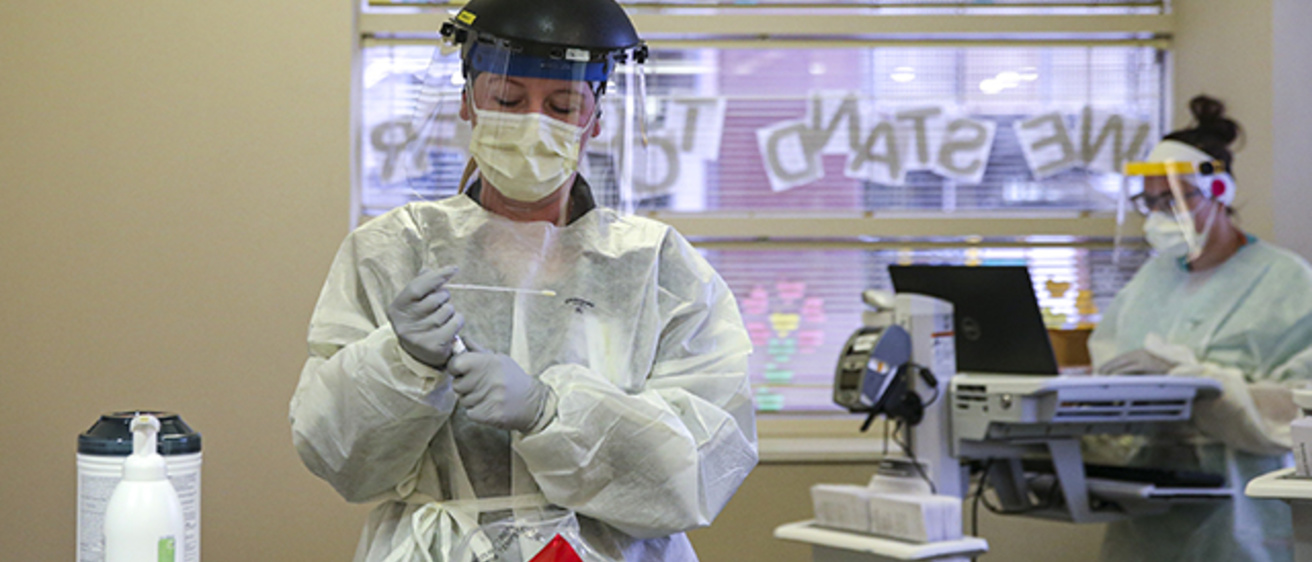When it comes to COVID-19 testing, the nasopharyngeal swab is the gold standard.
How to get a COVID-19 test on campus
Students: Call or email the Student Health Nurseline (319-335-9704, student-health@uiowa.edu) or contact your local health care provider, and inform them of your travel history and symptoms. After hours and on weekends, call University of Iowa Hospitals & Clinics (319-384-9010, or the 24-hour helpline at 319-384-8819) or contact your local health care provider.
Students may also schedule a video visit through MyChart.
Faculty/staff: Call your health care provider or UI Hospitals & Clinics (319-384-9010) and inform them of your travel history and symptoms, or schedule a video visit through MyChart.
If you are reporting to work on campus and are experiencing symptoms consistent with COVID-19, or you are diagnosed with the disease, stay home and report your illness to your supervisor and/or local human resources leader. Your supervisor or human resources leader will follow the COVID-19 self-reporting protocol to request a cleaning and ensure appropriate notification to fellow employees.
Despite the discomfort of having a six-inch swab stuck up one’s nose to collect a specimen, this method is the best way to detect the coronavirus, says Daniel Fick, University of Iowa campus health officer. Not only is it the method used on campus, it is the only one universally approved by the Food and Drug Administration for testing groups of different patient populations.
“The nasopharyngeal swab is basically 100% sensitive,” Fick says. “It’s not going to miss a virus or misidentify it, and there is very little chance of false tests. I am very confident in the results we are getting.”
While saliva or spit tests are getting attention in the media, and some organizations across the country are using them to screen asymptomatic people, Fick urges caution regarding these less invasive—and less accurate—tests. He says the UI is following guidance from the Centers for Disease Control and Prevention and sticking with the scientifically proven swab test. Samples collected on campus are processed at the UI’s Clinical Microbiology Laboratory or the State Hygienic Laboratory, with test results usually available within 24 hours.
“Spit tests have been tested on symptomatic people, those with large loads of virus, and are not yet FDA-approved for testing asymptomatic people. There is limited virus in saliva. The specimen we need to collect for testing is in the sputum—the mucus that is coughed up from the lower airways and in the back of the nasal packages—so for saliva testing, you are trying to snort and cough and get a loogie to spit into a cup. At best, the accuracy rate is 60%. At worst, it’s 30%,” he says. “At Iowa, we are using the best available science as our guide rather than chasing new tests that are reported in the media as just as good and more convenient or cheaper.”
Staff members in the Clinical Microbiology Laboratory have been processing up to 800 nasopharyngeal swab samples a day throughout the pandemic, including those for the athletics department. Lab director Bradley Ford says a well-validated collection method is essential to controlling spread of the virus.
—Daniel Fick, University of Iowa campus health officer
“The first step in diagnosis is taking a sample from where the virus is—and for SARS-CoV-2, that’s in the respiratory tract. Saliva is not part of the respiratory tract, and detectable amounts of virus are found there inconsistently,” says Ford, noting that emergency use of saliva tests has been authorized by the FDA only to specific labs for narrow use and is not transferable. “With a spit test, you’re much more likely to test negative when you actually have the virus. The danger in that is that it’s an invitation to not quarantine, to not social distance, or to not wear a mask.”
While the university is implementing recommended best practices for reducing exposure to COVID-19 on campus, including requiring face coverings and limiting class sizes, it is not routinely testing asymptomatic students.
Did you know?
The State Hygienic Laboratory at the University of Iowa has been at the forefront of public health issues in Iowa since 1904. As the state’s public health and environmental laboratory, it serves all 99 counties through disease detection, environmental monitoring, and newborn and maternal screening. To meet testing demands during the coronavirus pandemic, it has cross-trained staff and is operating 24/7; results, on average, are processed within 24 hours.
“There are several ways to mitigate the virus. We can adjust our operations, manage how our facilities are operated and used, and prepare to take care of people who are sick, but the most important one is promoting behavior that decreases the spread of the virus,” Fick says. “Testing a small percentage of students at one moment in time will not fundamentally make a long-term difference in curbing the spread of the disease. We need members of campus, and specifically students, to follow the recommendations to wear face coverings and practice social distancing both on and off campus.”
With national experts on staff in public health, medicine, and testing, university leadership is able to make informed decisions on the management of COVID-19. Another advantage, Ford says, is a collaborative campus environment.
“At Iowa, we work well together—that’s one of our strengths. Early on, when supplies were limited and we needed viral transport media to conduct the tests, we called up pharmacy and asked if they could help us develop our own, and they immediately said yes. You don’t see that everywhere,” Ford says. “We’ve managed our supplies well, and we’ve got an army of people who will quickly get you a top-quality test.”
